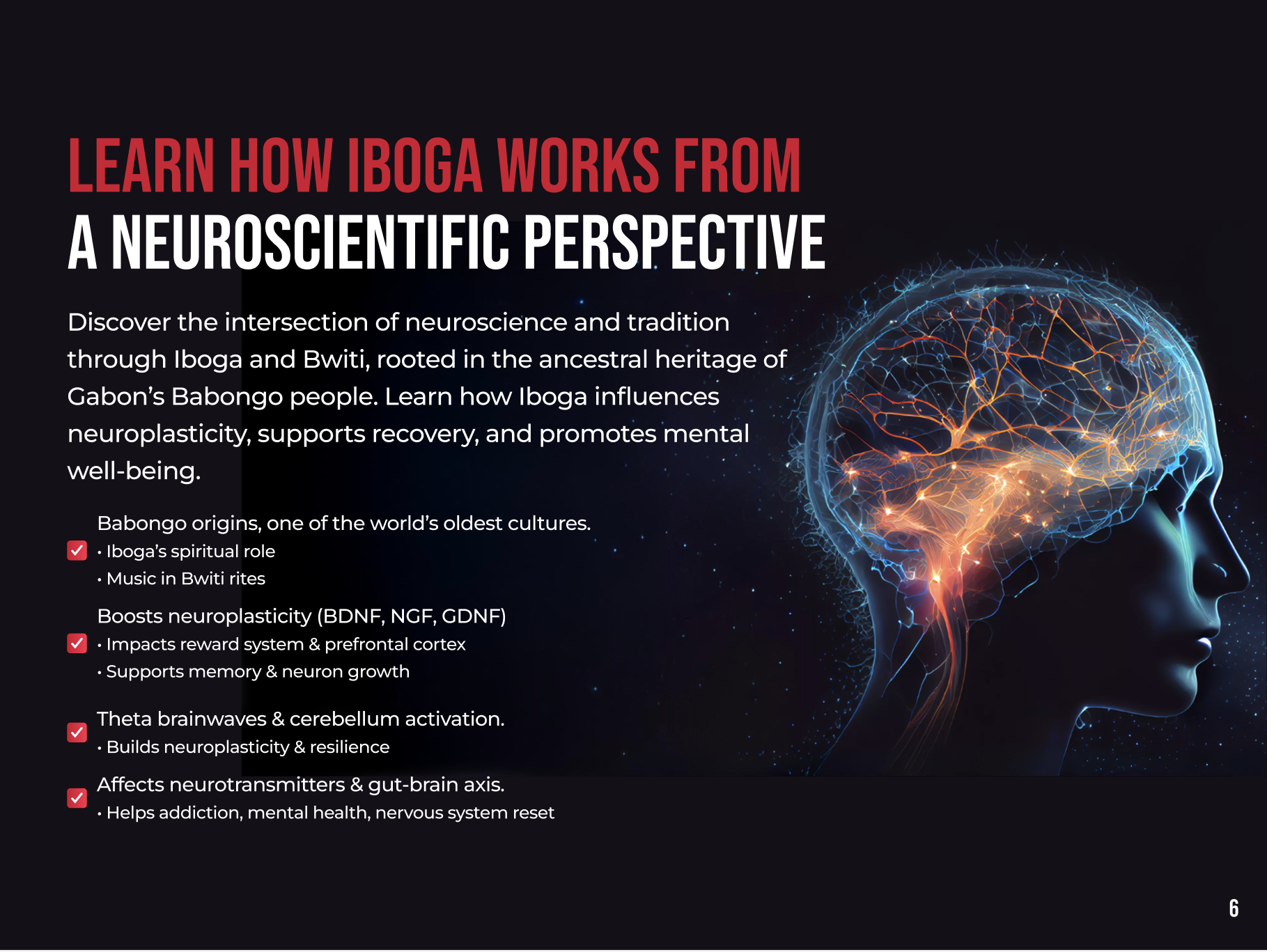The rise in heroin and opioid addiction has become one of the most devastating public-health crises of our time. Conventional treatments such as methadone, buprenorphine, or extended rehabilitation programs often manage symptoms but rarely address the root emotional, psychological, and spiritual causes of addiction.
For decades, researchers and traditional healers have turned their attention to Iboga and its active alkaloid Ibogaine, a sacred medicine from the Bwiti tradition of Gabon, renowned for its ability to reset both the body and the mind.
But how does Iboga help people struggling with heroin addiction, and what makes it different from modern treatments?
1. What Is Iboga and Ibogaine?
Iboga (Tabernanthe iboga) is a shrub native to Central Africa. In its traditional context, the Bwiti people have used it for centuries in rites of healing, initiation, and spiritual discovery.
Ibogaine, extracted from the root bark, is the main psychoactive alkaloid responsible for Iboga’s neurological and detoxifying effects. While science isolates Ibogaine for clinical use, the traditional Bwiti approach uses the full plant, believed to carry additional spiritual intelligence and healing energy.
2. How Iboga Affects Opioid Addiction
Research and clinical observation suggest that Ibogaine can interrupt physical dependence on opioids, including heroin, in several key ways:
- Neurochemical Reset:
- Ibogaine interacts with multiple neurotransmitter systems (dopamine, serotonin, NMDA, and opioid receptors). It appears to reset receptor sensitivity and restore natural balance in the brain, significantly reducing or eliminating withdrawal symptoms.
- Opioid Receptor Modulation:
- Unlike traditional opioids that perpetuate dependency, Ibogaine binds briefly to opioid receptors, providing temporary relief without reinforcement, helping the body transition out of addiction.
- Emotional and Psychological Insight:
- During the psycho-spiritual phase of the Iboga experience, individuals often revisit life memories, traumas, and root causes of their addictive behavior. This life review helps break unconscious cycles that drive dependency.
- Reduction of Cravings:
- Many participants report that, following an Iboga experience, the urge to use heroin or opioids drastically decreases, often for months or years.
3. Clinical Evidence and Studies
Scientific studies, though limited by regulatory barriers, have shown promising results:
- Withdrawal Suppression:
- Observational studies and case reports show that 70–90% of participants experience minimal or no withdrawal symptoms after Ibogaine detox.
- Craving Reduction:
- Follow-ups suggest that Ibogaine substantially reduces cravings and relapse rates compared to conventional detox alone.
- Long-Term Outcomes:
- The best results are seen when Ibogaine treatment is combined with integration therapy, ongoing support, and lifestyle changes, not as a quick fix, but as a gateway to transformation.
4. Why Traditional Bwiti Initiation Is Different
While Western clinics often administer isolated Ibogaine in sterile environments, Bwiti initiations offer a holistic, ancestral context that merges body, mind, and spirit.
Under the guidance of Moughenda Mikala, a recognized Bwiti Master Healer, and the elders at Bwiti House, participants go through a process that includes:
- Comprehensive medical screening before arrival (ECG, liver panel, medication review).
- Preparation and purification rituals to align the body and spirit.
- Ceremonial Iboga journeys guided by music, fire, and ancestral invocation.
- Integration sessions that help participants understand their visions and apply the lessons in daily life.
This framework ensures that the healing is not merely biochemical but existential, a rebirth into a new way of living.
5. Is It Safe?
When performed in a traditional or medically supervised setting, Iboga is generally safe.
However, unsupervised or synthetic Ibogaine use can be dangerous, especially for those with heart, liver, or psychiatric conditions.
At Bwiti House, every participant undergoes strict health screening and is supervised by trained providers and medical staff.
Safety, lineage, and respect for the medicine are paramount.
6. Iboga as a Catalyst, Not a Cure
Iboga does not “cure” addiction by itself.
Rather, it creates the conditions for deep healing, physically breaking withdrawal, emotionally revealing the roots of pain, and spiritually reconnecting the individual with purpose.
The medicine opens the door, but walking through it requires commitment, integration, and ongoing support.
7. The Bwiti Perspective on Healing Addiction
In the Bwiti understanding, addiction is not simply a chemical imbalance; it’s a spiritual disconnection, a loss of harmony between the self and the truth.
Iboga helps restore that harmony by reconnecting the person with their essence, ancestors, and the natural world.
This spiritual realignment often leads to a natural rejection of self-destructive habits, a renewed sense of clarity, and a deep peace that conventional detox alone rarely achieves.
Conclusion
Can Iboga help with heroin addiction?
The answer is yes, when approached with the right guidance, safety, and respect.
Iboga is not a magic pill, but a sacred teacher that works on every level of the human being.
Through the fusion of traditional wisdom and modern care, it offers something rare: a chance not only to end addiction, but to reclaim one’s life, purpose, and soul.
At Bwiti House, each participant is guided safely through this process, combining authentic Bwiti lineage, medical integrity, and integration support to help those ready for real transformation.











